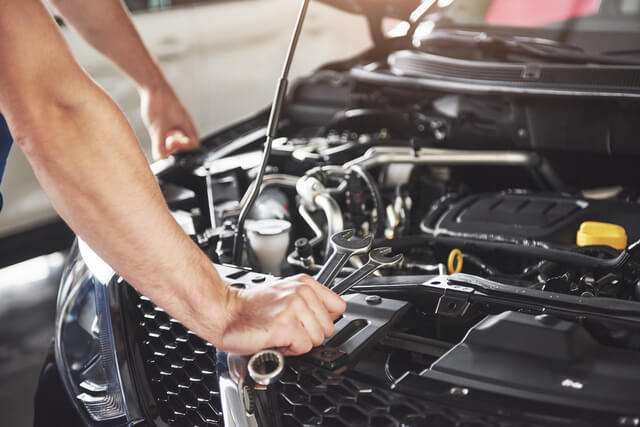It’s right that a car engine and an outboard differ. Certain features of a car engine are not compatible with that of a boat. A lubrication system, for instance, is one of the major differences between a car engine and a boat engine. So, one can’t use an automobile engine as a marine engine. However, this is possible after proper alterations. I will teach you how to convert a car engine to a boat engine.
Many technical persons are making their outboards for small recreational boats by making some alterations in a car engine. To do this, one should have a grip over ‘ how to convert a car engine into a boat engine? ‘.
You may know that gasoline engines can be a strong way to power a boat. With a few modifications, it will run perfectly on an outboard too. The required parts are easily available in the market at an affordable price. However, purchasing these from a marine dealer as an automotive dealer will charge more than a mariner. This guide will discuss all facts about using a car engine in a boat. So, let’s go through this guide to explore something unique.
How to Convert a Car Engine to a Boat Engine?

An automobile engine fails to perform in the water as it is designed for roads, not marine uses. You’ll have to go for certain modifications to use it for a boat. After alterations, you can use it for your boat too. Here are some alterations that you’ll have to do in an automobile engine to make it perform in water too.
Requirements for Alterations
To modify your car engine for your boat, you’ll need the following tools and components.
- A Water-Based Cooling Exhaust
- A Water Pump Specialized for Marine Uses
- Carburetor Tilter
- A Flame Catcher for Carburetor
- Solid Brass Plugs
- Special Engine Mounts
- Oil Filter Modification Tools
- Exhaust Elbows for Marine Use
- Water Cooler Cover Plates
- Extensions for Starters
Depending on the engine model and manufacturing, you may need some additional components. However, these are the essential ones that will replace the genuine car engine’s parts. Now let’s check which alterations are necessary to convert a car engine into a boat engine.
Broad Power Camshaft
The road engines feature a speed increasing, speed decreasing, and gear transmission system. This will need a different mechanism as compared to that of the boat.
In a car, a camshaft with a narrow power band is used. But marine engines have a fixed speed for forwarding as well as reverse. So, replace the narrow power band camshaft with a broad power camshaft that may range from 500 RPM to 5000 RPM.
This alteration is necessary as there is no gear change system in a boat. When you replace the narrow power band with an extended power band, it will generate maximum torque. This torque, in turn, will provide much power to the boat.
Flame Catcher
The car engine features an air cleaner due to road pollution hazards operated on the water surface. The boat will feature relatively low air pollution. So, it doesn’t need an air cleaner. Replace this component of the engine with a flames catcher or arrester. This will catch fire coming out of the gasoline engine. A flame catcher prevents the possible risk of explosion that may result from backfire. Check out the flame catcher according to your engine’s type.
Use Ignition Free Alternators
The alternators used in a car engine create a spark upon ignition or starting. This is a risky operation in the case of a boat. So, replace the sparking alternators with ignition-free alternators. These feature a mechanism that sucks up all the heat causing due to the ignition. So, the screens used in these switches prevent the temperature from reaching a risky level. So, replace all the ignition alternators with ignition-free alternators.
Water Cooled Exhaust System
An automobile engine features an air cooling system for the exhaust. This is not an ideal one for marine use. Moreover, the engine heat may result in certain issues. So, it’s good to replace the air-cooled exhaust with that of water-cooled.
Water Pump Specialized for Marine Uses
The automotive engine has a circulating water system that cools the engine. This system doesn’t pump the water into the engine. However, the outboard engine must pump the water inside the engine to keep it cool.
Also, the car engine has less resistance to marine water effects like corrosion. So, it would help if you went for an alteration that may help the cooling system withstand even in saltwater.
You can replace the traditional pumping system with a rubber-type compeller that can withstand marine situations. Moreover, this type of pump will run slower than a car engine.
Replace Steel Plugs with Brass Plugs
Your car engine will have a freeze or expansion plug made of steel. This kind of plug will not be ideal for marine uses. The corrosion and rustic effect of the marine water will lead to the inefficiency of the plug. So, it’s good to replace it with steel so that your outboard may work effectively. If you can’t find enough brass plugs to replace all, you can consider altering just those in contact with water.
Other Essential Alterations
Besides the alterations mentioned above, the following alterations are also necessary.
- Adjustment of the oil filter.
- Special mounting of the engine, as per need.
- Insert plates covering pulleys.
- Relocate the starter motor where it’s not in touch with marine water.
- Tilt carburetor as per need.
Conclusion
Automotive engines fail to perform in marine as these are made for road uses. However, you can insert your car’s engine in the small boat by doing some essential alterations to it. Most of the parts designed for road uses can’t sustain marine water. So, replace all those engine parts vulnerable to danger when in contact with the water. We have illustrated some major alterations to be made in an automobile engine if you want to use it in a boat.

James Carter is an automotive blogger, reviewer, and technology enthusiast based in the USA. With a deep passion for cars and years of experience following the automotive industry, James focuses on delivering honest, well-researched content that helps readers make smarter decisions.

